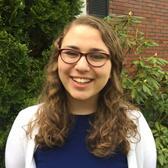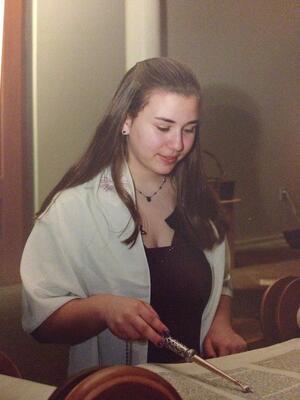Broadening Horizons: The Jewish (and Feminist) World Beyond Mine
This month our Rising Voices Fellows are examining how their Jewish and feminist identities intersect. Be sure to check the JWA blog each Tuesday for a new post from our fellows—and check out the great educational resources provided by our partner organization, Prozdor.
I became bat mitzvah on May 1, 2010 in front of my congregation. I wore a tallit, chanted Torah, and gave a d’var Torah. To me, that was normal. My mom became bat mitzvah before me, on the same bimah, years before.
The cantor at my synagogue arrived the year after my mother became bat mitzvah. She was present at my parents’ wedding and at my baby naming. In my lifetime we have had two female rabbis and countless Jewish women professionals dedicate their time and energy into making Temple Beth Elohim what it is today.
For a long time in my world, “feminist” and “Jewish” existed in separate spheres. As far as I knew, feminism did not exist in the Jewish world because everything there was about as equal as you could get. Women were rabbis and cantors, educators and students, same as the men. Feminism was for the corporate world, where women did not make as much as men, or were excluded from managerial position jobs. Needless to say, my definition of feminism was narrow, as was my understanding of Judaism, and as I widened the circles of each, they began to overlap.
I grew up sitting beside my dad at services, alternating between carefully braiding and unbraiding the fringes of his tallit and listening to the unfamiliar sounds of Hebrew. I could not imagine a world where little girls did not sit next to their fathers. This is how we pray, I thought, kids and grown ups and men and women all together. I did not know that it is different for other Jews.
In seventh and eighth grade, during the age of bar and bat mitzvahs every weekend, I attended Saturday morning services at many different congregations: some Reform, some Conservative, some with more singing, some with more chanting. One day, I received a simple invitation for a “women’s minyan.” Grateful for the later start time than most, I did not think much of the difference… other than I would be granted an extra hour or two of sleep on that Saturday.
The morning arrived and my mother and I entered the synagogue. The only men in sight were my friend’s father and a few uncles. Following the crowd, I entered on one side of the sanctuary; the other I could see over a dividing wall. A few minutes later, the service began. A girl I knew vaguely from Facebook began each prayer, but her leading was not necessary for long. The words slipped from the women’s lips faster than I could possibly imagine, and their bodies moved in time with the rhythm. A sort of magic built up inside the room with only women. Unlike in my synagogue, there were no instruments, no microphones, just the voices of about thirty women praying.
Even though my friend was not allowed to chant Torah like I was, and was not allowed to lead prayers at the traditional morning service, the spirituality of the all women’s minyan made it incredibly unique and special.
I still love my sanctuary, listening to my female cantor sing the familiar melodies while strumming her guitar. But, the power of the women in a sanctuary is extremely important. They have an undeniable passion when they pray that sometimes cannot be heard. It does not matter how women participate in Judaism, next to their husbands, brothers, and sons, or in a dedicated women-only prayer time. All that counts is their chance to pray, to connect with Judaism and with each other.
In my synagogue, the focus on female participation often slides under the radar, as that participation has come to be expected. It took an environment of female power and spirituality for me to understand the significance and influence women have in their Jewish communities.
This piece was written as part of JWA’s Rising Voices Fellowship.







